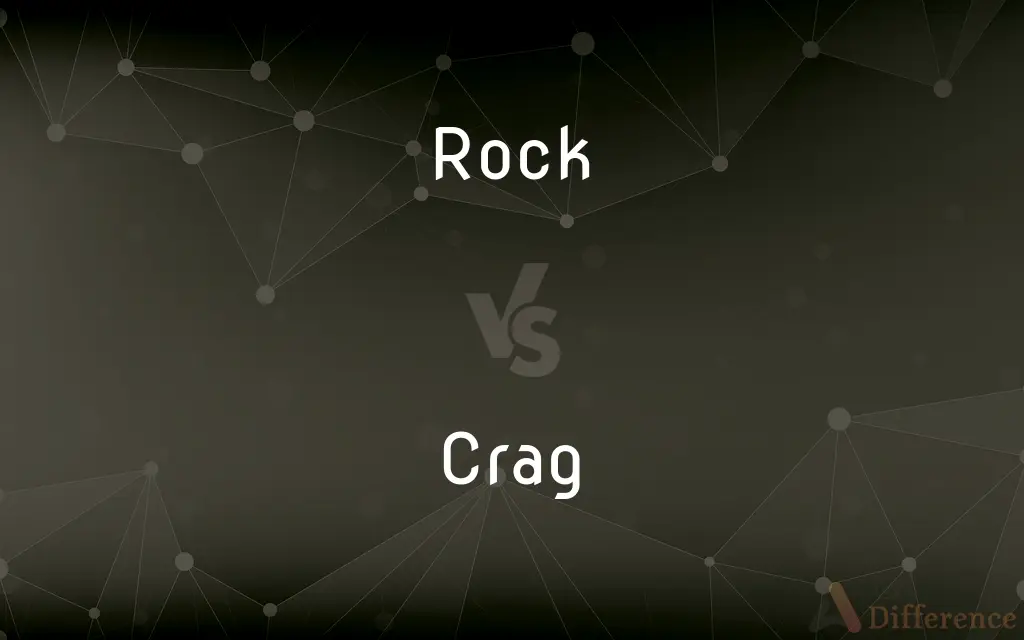Rock vs. Crag — What's the Difference?
Edited by Tayyaba Rehman — By Urooj Arif — Updated on April 17, 2024
Rock refers generally to any natural solid mineral material, while a crag specifically denotes a steep or rugged cliff or rock face.

Difference Between Rock and Crag
Table of Contents
ADVERTISEMENT
Key Differences
A rock is a solid mineral formation found naturally on Earth, commonly used in various contexts ranging from construction to landscaping. On the other hand, a crag refers more specifically to a steep, rugged rock face, often seen as part of a cliff or mountain.
While rocks can vary greatly in size, from small pebbles to huge boulders, crags are typically large and imposing, frequently used as terms in climbing and hiking.
Rocks serve various functions, including building materials or decorative elements in landscaping. In contrast, crags are primarily known for their aesthetic and recreational values, especially in natural and scenic settings.
The study of rocks is a fundamental aspect of geology, helping scientists understand Earth's history and structure. Whereas, crags, while also studied by geologists, often hold more interest for ecologists and environmentalists studying specific habitats and ecosystems.
Rocks can be found worldwide in a multitude of environments, from riverbeds to deserts. Crags, however, are typically associated with more dramatic landscapes like mountain ranges and coastal cliffs.
ADVERTISEMENT
Comparison Chart
Definition
A natural solid mineral material of varied size.
A steep or rugged cliff or rock face.
Size
Can range from pebbles to boulders.
Typically large and imposing.
Function
Building, decoration, study.
Climbing, hiking, scenic views.
Interest in Study
Geology, general study of Earth.
Geology, ecology, specific habitats.
Typical Location
Found globally in diverse environments.
Found in dramatic landscapes like mountains.
Compare with Definitions
Rock
A consolidated mineral matter.
Granite is a common type of rock used in countertops.
Crag
A naturally elevated rocky landform.
The hikers admired the view from atop the crag.
Rock
Any natural material hard and compact.
The rock formations at the park are over millions of years old.
Crag
A steep or rugged cliff.
The eagle’s nest was located high on the crag.
Rock
A naturally occurring solid aggregate of minerals.
Limestone rocks are often used in road base construction.
Crag
A prominent rock feature in landscapes.
Photographers gathered at the crag to capture the sunset.
Rock
A small to large piece of mineral material.
She skipped a flat rock across the lake.
Crag
Part of a rocky hill or mountain.
From the summit, the crag looked formidable.
Rock
A major component of the Earth's crust.
The geologist explained how rocks are formed from magma.
Crag
A rock face suitable for climbing.
The climbers tackled the challenging crag by midday.
Rock
The solid mineral material forming part of the surface of the earth and other similar planets, exposed on the surface or underlying the soil
A piece of rock
A spectacular rock arch
The beds of rock are slightly tilted
Crag
A steep rugged mass of rock projecting upward or outward.
Rock
A large piece of rock which has become detached from a cliff or mountain; a boulder
The stream flowed through a jumble of rocks
Crag
A rocky outcrop; a rugged steep cliff or rock.
Rock
Used to refer to someone or something that is extremely strong, reliable, or hard
The Irish scrum has been as solid as a rock
Crag
A rough, broken fragment of rock.
Rock
Money.
Crag
(geology) A partially compacted bed of gravel mixed with shells, of the Pliocene to Pleistocene epochs.
Rock
Rock music
The store plays a peculiar blend of 70s and 80s rock
A rock concert
Crag
The neck or throat.
Rock
A gentle movement to and fro or from side to side
She placed the baby in the cot and gave it a rock
Crag
A steep, rugged rock; a rough, broken cliff, or point of a rock, on a ledge.
From crag to crag the signal flew.
Rock
Move gently to and fro or from side to side
The vase rocked back and forth on its base
She rocked the baby in her arms
Crag
A partially compacted bed of gravel mixed with shells, of the Tertiary age.
Rock
Dance to or play rock music
He looked a totally different man and ready to rock
Crag
The neck or throat
And bear the crag so stiff and so state.
Rock
Wear (a garment) or affect (an attitude or style), especially in a confident or flamboyant way
She was rocking a clingy little leopard-skin number
Crag
The neck piece or scrag of mutton.
Rock
Relatively hard, naturally formed mineral or petrified matter; stone.
Crag
A steep rugged rock or cliff
Rock
A relatively small piece or fragment of such material.
Rock
A relatively large body of such material, as a cliff or peak.
Rock
A naturally formed aggregate of mineral matter constituting a significant part of the earth's crust.
Rock
One that is similar to or suggestive of a mass of stone in stability, firmness, or dependability
The family has been his rock during this difficult time.
Rock
Rocks(Slang) Money.
Rock
(Slang) A large gem, especially a diamond.
Rock
(Slang) Crack cocaine.
Rock
A varicolored stick candy.
Rock
Rock candy.
Rock
A rocking motion.
Rock
The act of rocking.
Rock
(Music) A form of popular music characterized by electronically amplified instrumentation, a heavily accented beat, and relatively simple phrase structure. Originating in the United States in the 1950s, rock incorporates a variety of musical styles, especially rhythm and blues, country music, and gospel. Also called rock-and-roll, rock 'n' roll.
Rock
To move back and forth or from side to side, especially gently or rhythmically.
Rock
To sway violently, as from a blow or shock.
Rock
To be washed and panned in a cradle or in a rocker. Used of ores.
Rock
(Music) To play or dance to rock music.
Rock
(Slang) To be excellent or outstanding. Used in exclamations of approval.
Rock
To move (a child, for example) back and forth or from side to side, especially in order to soothe or lull to sleep.
Rock
To cause to shake or sway violently.
Rock
To disturb the mental or emotional equilibrium of; upset
News of the scandal rocked the town.
Rock
To excite or cause strong feeling in, as by playing rock music.
Rock
To wash or pan (ore) in a cradle or rocker.
Rock
In mezzotint engraving, to roughen (a metal plate) with a rocker or roulette.
Rock
(Slang) To exhibit, display, or use with flair
The actor rocked a pair of diamond-studded sunglasses at the movie premiere.
Rock
A formation of minerals, specifically:
Rock
(uncountable) The naturally occurring aggregate of solid mineral matter that constitutes a significant part of the earth's crust.
The face of the cliff is solid rock.
Rock
A mass of stone projecting out of the ground or water.
The ship crashed on the rocks.
Rock
(chiefly British) A boulder or large stone; or a smaller stone; a pebble.
Some fool has thrown a rock through my window.
Rock
(geology) Any natural material with a distinctive composition of minerals.
Rock
(slang) A precious stone or gem, especially a diamond.
Look at the size of that rock on her finger!
Rock
A large hill or island having no vegetation.
Pearl Rock near Cape Cod is so named because the morning sun makes it gleam like a pearl.
Rock
(figuratively) Something that is strong, stable, and dependable; a person who provides security or support to another.
Rock
A lump or cube of ice.
I'll have a whisky on the rocks, please.
Rock
A type of confectionery made from sugar in the shape of a stick, traditionally having some text running through its length.
While we're in Brighton, let's get a stick of rock!
Rock
A crystallized lump of crack cocaine.
Rock
An unintelligent person, especially one who repeats mistakes.
Rock
An Afrikaner.
Rock
An extremely conservative player who is willing to play only the very strongest hands.
Rock
Any of several fish:
Rock
The striped bass.
Rock
The huss or rock salmon.
We ordered rock and chips to take away.
Rock
A basketball.
Yo homie, pass the rock!
Rock
A mistake.
Rock
(curling) stone.
Rock
(rock paper scissors) A closed hand (a handshape resembling a rock), that beats scissors and loses to paper. It beats lizard and loses to Spock in rock-paper-scissors-lizard-Spock.
Rock
A cricket ball, especially a new one that has not been softened by use
Rock
A crystal used to control the radio frequency.
Rock
An act of rocking; a rocking motion; a sway.
Rock
A style of music characterized by basic drum-beat, generally 4/4 riffs, based on (usually electric) guitar, bass guitar, drums, and vocals.
Rock
(countable) Distaff.
Rock
(uncountable) The flax or wool on a distaff.
Rock
To move gently back and forth.
Rock the baby to sleep.
The empty swing rocked back and forth in the wind.
Rock
(transitive) To cause to shake or sway violently.
Don't rock the boat.
Rock
(intransitive) To sway or tilt violently back and forth.
The boat rocked at anchor.
Rock
To be washed and panned in a cradle or in a rocker.
The ores had been rocked and laid out for inspection.
Rock
(intransitive) To do well or to be operating at high efficiency.
Rock
To be cool.
That band rocks!
Rock
(intransitive) To sway one's body as a stim.
Rock
(intransitive) To play, perform, or enjoy rock music, especially with a lot of skill or energy.
Let's rock!
Rock
To be very favourable or skilful; excel; be fantastic.
Chocolate rocks.
My holidays in Ibiza rocked! I can't wait to go back.
Rock
(transitive) To thrill or excite, especially with rock music.
Let's rock this joint!
Rock
(transitive) To do something with excitement yet skillfully.
I need to rock a piss.
Rock
(transitive) To wear (a piece of clothing, outfit etc.) successfully or with style; to carry off (a particular look, style).
Rock
See Roc.
Rock
A distaff used in spinning; the staff or frame about which flax is arranged, and from which the thread is drawn in spinning.
Sad Clotho held the rocke, the whiles the threadBy grisly Lachesis was spun with pain,That cruel Atropos eftsoon undid.
Rock
A large concreted mass of stony material; a large fixed stone or crag. See Stone.
Come one, come all! this rock shall flyFrom its firm base as soon as I.
Rock
Any natural deposit forming a part of the earth's crust, whether consolidated or not, including sand, earth, clay, etc., when in natural beds.
Rock
That which resembles a rock in firmness; a defense; a support; a refuge.
The Lord is my rock, and my fortress.
Rock
Fig.: Anything which causes a disaster or wreck resembling the wreck of a vessel upon a rock.
Rock
The striped bass. See under Bass.
Rock
To cause to sway backward and forward, as a body resting on a support beneath; as, to rock a cradle or chair; to cause to vibrate; to cause to reel or totter.
A rising earthquake rocked the ground.
Rock
To move as in a cradle; hence, to put to sleep by rocking; to still; to quiet.
Rock
To move or be moved backward and forward; to be violently agitated; to reel; to totter.
The rocking townSupplants their footsteps.
Rock
To roll or saway backward and forward upon a support; as, to rock in a rocking-chair.
Rock
A lump or mass of hard consolidated mineral matter;
He threw a rock at me
Rock
Material consisting of the aggregate of minerals like those making up the Earth's crust;
That mountain is solid rock
Stone is abundant in New England and there are many quarries
Rock
United States gynecologist and devout Catholic who conducted the first clinical trials of the oral contraceptive pill (1890-1984)
Rock
(figurative) someone who is strong and stable and dependable;
He was her rock during the crisis
Thou art Peter, and upon this rock I will build my church
Rock
Hard stick bright-colored stick candy typically peppermint flavored
Rock
A genre of popular music originating in the 1950s; a blend of Black rhythm-and-blues with White country-and-western;
Rock is a generic term for the range of styles that evolved out of rock'n'roll.
Rock
Pitching dangerously to one side
Rock
Move back and forth or sideways;
The ship was rocking
The tall building swayed
She rocked back and forth on her feet
Rock
Cause to move back and forth;
Rock the cradle
Rock the baby
The wind swayed the trees gently
Common Curiosities
How do rocks form?
Rocks form through various geological processes such as cooling of magma, deposition of sediment, or alteration by heat and pressure.
Are crags dangerous to climb?
Climbing crags can be dangerous without proper equipment and training due to their steep and rugged nature.
Can rocks be used in art?
Yes, rocks are often used in artistic endeavors, including sculpture and decorative landscaping.
What activities are crags associated with?
Crags are popular among climbers and hikers due to their steep and challenging nature.
What is the largest rock type?
The largest type of rock by volume on Earth is igneous rock, which forms from solidified magma.
What types of rocks are there?
Rocks are categorized into three main types: igneous, sedimentary, and metamorphic.
How do geologists study rocks?
Geologists study rocks by examining their mineral composition, structure, and formation processes to understand the Earth’s history.
What is the ecological significance of crags?
Crags can create unique microenvironments that support specialized plants and animals not found in other habitats.
Do crags appear in any specific geographical locations?
Crags most commonly appear in mountainous regions, along coastlines, or other areas where erosive forces expose substantial rock faces.
How do crags impact the landscape?
Crags can dominate landscapes, offering striking natural landmarks and contributing to the area's scenic beauty.
Share Your Discovery

Previous Comparison
Carbon vs. Carbide
Next Comparison
Ableism vs. AudismAuthor Spotlight
Written by
Urooj ArifUrooj is a skilled content writer at Ask Difference, known for her exceptional ability to simplify complex topics into engaging and informative content. With a passion for research and a flair for clear, concise writing, she consistently delivers articles that resonate with our diverse audience.
Edited by
Tayyaba RehmanTayyaba Rehman is a distinguished writer, currently serving as a primary contributor to askdifference.com. As a researcher in semantics and etymology, Tayyaba's passion for the complexity of languages and their distinctions has found a perfect home on the platform. Tayyaba delves into the intricacies of language, distinguishing between commonly confused words and phrases, thereby providing clarity for readers worldwide.














































